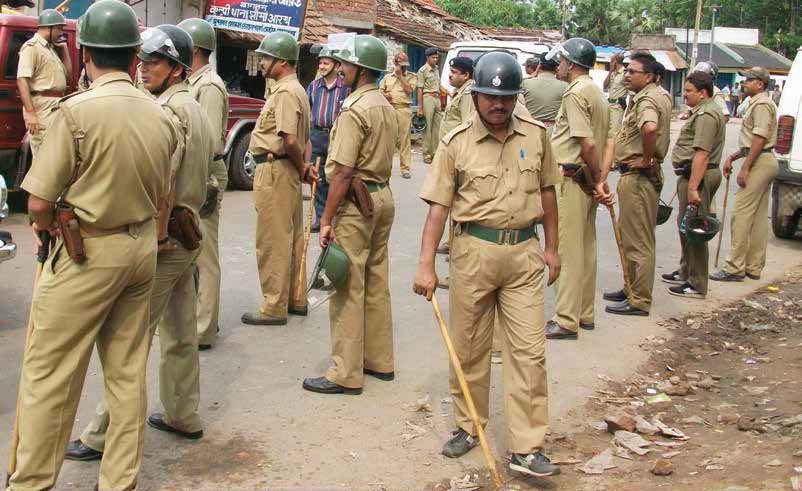This article is written by Ilashri Gaur, a law student pursuing B.A LLB (Hons.) from Teerthanker Mahaveer University (CLLS). This is an exhaustive article dealing with the provisions regarding the criminal offences and their procedure.
Table of Contents
Introduction
In this article we will deal with the definitions of the criminal offences and criminal procedure;
- The “criminal procedure’’ is the arbitration process of the criminal law. This process generally begins with a framing of criminal charge with the person on trial either being free on bail or imprisoned.
- The ‘’criminal offences’’ means when an act which is harmful not only to the individual but also to society or the community and which is punishable under the law is termed as a criminal offence.
The procedure to punish for any offence is given under the Criminal Procedure Code.
The Criminal Procedure Code, 1973
The Criminal Procedure Code, 1973 is the procedural law which provides the machinery for the punishment to commit any offence under the substantive criminal law. The criminal procedure code contains detailed procedures to be followed in every investigation, inquiry, and trial for every offence under the Indian Penal Code, 1860.
At first, there was no uniform law of procedure for the whole of India. It was the Criminal Procedure Code, 1882 that gave for the first time such a uniform law of procedure. It was amended in 1898, then in 1923 and in 1955. Then again suggestions were made regarding this in 1969 and after all these suggestions and amendments finally, all these changes were made legally valid in the code of 1973.

CrPC under Indian Stamp Act, 1899
Indian Stamp Act is an act to combine and amend the law relating to the stamps whereas it is expedient to combine and amend the laws relating to stamps. Chapter 7 of the Indian Stamp Act deals with criminal offences and procedures. Section 62 to Section 72 deals for the same.
|
It deals with the penalty for executing or for not paying stamp duty on the instrument. |
|
|
Penalty for failure to meet with the provisions of section 9A. |
|
|
Penalty for failure to cancel the adhesive stamp. |
|
|
Penalty for omission to obey the provisions of section 27. |
|
|
Penalty for refusal to give a receipt and for devices to evade duty on receipts. |
|
|
Penalty for not making out a policy or making one not duly stamped. |
|
|
Penalty for not drawing the full number of bills or marine policies claim to be in sets. |
|
|
Penalty for post-dating the bills and for the other devices to defraud the revenue. |
|
|
Penalty for the breach of a rule relating to the sale of stamps and for unauthorized sale. |
|
|
Institution and conduct of prosecution. |
|
|
Jurisdiction of magistrates. |
|
|
Place of trial. |
Let us discuss these sections in detail:
Penalty for executing
Section 62 of the Indian Stamp Act deals with the penalty for execution. It means that penalty will be charged for executing or for not paying stamp duty. The person will be liable if:
- The drawings, making, issuing, endorsing or transferring or signing apart from the witness, or presenting for acceptance or for payment or by accepting, receiving or paying the payment in any manner negotiating any bill of exchange or promissory note without the same being correctly stamped.
- If the person executing or signing, apart than as a witness, any other instrument chargeable with duty without the same being correctly stamped.
- If voting or attempting to vote is done by any proxy which is not duly stamped will be so punished for such offences with a fine which may extend to five hundred rupees. It says that when any penalty has been paid in respect of any instrument under section 35, section 40, and section 61 the amount of the fine will be allowed in the reduction of the fine which is afterwards imposed under this section.
If the share warrant is issued without being duly stamped by the company, or by every person or by the Managing Director or Secretary or by other principal officers of the company, it will be punishable with a fine which can be extended to five hundred rupees.
Penalty for failure to meet with Section 9A
Section 62A deals with the penalty will be charged for the failure to meet with the provision of Section 9A. It says that any person who:
- Under sub-section (1) of section 9A, to collect duty and if it fails to collect the same then the penalty will be charged.
- Under sub-section (4) of section 9A, to transfer the duty to the state government within fifteen days of the expiry of the given time period and if it fails to transfer within the given time then the penalty will be charged. The penalty will be fine and it will not be less than one lakh rupees which may extend to 1% of the collection or transfer.
- Under sub-section (5) of section 9A, to submit details of the transactions to the government and if it fails to do so then the penalty will be charged.
- Submits a document and makes a declaration that is false or which a person believes to be false will be charged with the penalty of one lakh rupees for each day during the days where such failure continues or directly pays rupees one crore rupees whichever is less.
Penalty for failure to cancel the adhesive stamps
Section 63 deals with the penalty for failure to cancel the adhesive stamps. Let us first understand what adhesive stamps are; Adhesive stamps are the postage stamps that are pressure-sensitive and do not require moistening in order to stick fast to paper.
Penalty for omission to obey with provisions of section 27
Section 64 deals with the penalty for omission to comply with the provisions of section 27. Any person with the intention to defraud the government then the penalty will be charged against him. Or;
- If a person executes any instrument in which all the facts and circumstances required by section 27 to be put down, but are not fully and truly set forth.
- If any person employed or concerned in or about the preparation of any instruments, which neglects or omits fully and truly to put down therein all such facts and circumstances.
- If the person does any other act deliberately to deprive the government of any duty or penalty under this act, will be punishable with a fine and which may increase to five thousand rupees.
Penalty for refusal to give a receipt and for devices to evade duty on receipts
Section 65 deals with the penalty for refusal to give a receipt and for the device to evade duty on receipts. It says that:
- Any person who is required under section 30 to give a receipt, refuses or neglects to give the same.
- Any person with the intention to defraud the government of any duty, upon a payment of money or delivery of property which exceeds twenty rupees in amount or values and which gives a receipt for a property paid or delivered will be punishable with fine which may even extend to one hundred rupees.
Penalty for not making out a policy or making not one duly stamped
Section 66 deals with the penalty if any person not making out a policy or making it not duly stamped. It says that any person who:
- receives or takes credit for any premium or consideration for any contract of insurance and does not receive within one month. After receiving or taking credit for such premium or consideration for any contract, it was required to make out and execute a duly stamped policy of such insurance.
- If a person makes, executes or delivers out any policy which is not duly stamped, or agrees to pay or allows in the account any money or in respect of any such policy, then he will be punishable with the fine which may extend to two hundred rupees.
Penalty for not drawing a full number of bills or sea-related policies claim to be in sets
Section 67 deals with the penalty that will be given if the person does not draw a full number of bills or sea-related policies claimed to be in sets. It says that any person drawing or executing a bill of exchange or a policy of marine insurance claims to be drawn or executed in a set of two or more and not at the same time drawing will be punishable with fine which may extend to one thousand rupees.
Penalty for post-dating the bills and for the other tools to defraud the revenue
Section 68 deals with the penalty charged against a person for post-dating the bills and for the other devices to defraud the revenue. It says that:
- Any person with the intention to defraud the government of duty, produce a matter regarding any bills of exchange or promissory note bearing data ensuring that such bills or note is actually drawn or made.
- Any person who knows that such bills or notes have been so post-dated, endorsed, transferred, etc to present for acceptance or for the payment of such bills or note in any manner negotiates the same.
- Any person with the intention to practice or is concerned in any act, and in any contrivance not specially provided for this Act but in any other law for the time being in force will be punishable with a fine which may extend to one thousand rupees.
Penalty for breach of order relating to the sale of stamps and for unauthorized sale
Section 69 deals with the penalty that will be charged against a person for breach of rule relating to sale and for unauthorized sale. It says that:
- Any person who is appointed to sell stamps who disobeys any rule made under section 74.
- Any person who is not so appointed to sell or offers any stamps for sale will be punishable with imprisonment for the term which can be extended to six months or with a fine which may extend to five hundred rupees or both.
Institution and conduct of the prosecution
Section 70 deals with the institution and conduct of the prosecution. It says that:
- No prosecution under this act will be punishable in respect of any offence and it will be instituted without the sanction of the collector or such other officers or the collectors specially authorized on that behalf.
- The Chief Controlling Revenue Authority or any officer which is generally or specially authorized by it on his behalf, will stay in any such prosecution or compound of any such offence.
- The amount of any such composition will be recoverable in any manner provided by Section 48.
Jurisdiction of Magistrates
Section 71 deals with the jurisdiction of a Magistrate under the Indian Stamp Act. It says that no magistrate other than a Presidency Magistrate or a Magistrate whose powers are not less than those of a Magistrate of the second class will try any offence under this act.
Place of trial
Section 72 deals with the place of trial for any offence. It says that every such offence committed in respect of any instrument will be tried in any district or presidency-town in which such instrument is formed as well as in any district or presidency in which such offence might be tried under the Code of Criminal Procedure for the time being in force.
Conclusion
As we all know that the crime rate has been increasing in India. In such a situation there is a need for such procedures against any offences and the CrPC provides guidelines to any criminal offences and its punishment under the Indian Penal Code, 1860. It is the machinery of punishment for those who commit crime. There are various provisions mentioned regarding the penalty and punishment for the same in the Indian Stamp Act, 1899.
LawSikho has created a telegram group for exchanging legal knowledge, referrals and various opportunities. You can click on this link and join:
 Serato DJ Crack 2025Serato DJ PRO Crack
Serato DJ Crack 2025Serato DJ PRO Crack










 Allow notifications
Allow notifications


